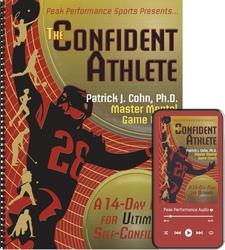
Can Your Self-Talk Improve How You Perform?
The more poignant question is whether self-talk affects or impacts competitive play.
To determine if self-talk has influenced your performance, think of previous performances when you completely fell apart in a competition.
What were your thoughts before spiraling downward? Did you mentally beat yourself up over a mistake or tell yourself you have no talent? Did you talk yourself out of beating a higher-ranked opponent or team with a better record? Did you use phrases such as “I can’t,” “I won’t,” or “I will never be able to”?
These are forms of self-talk. If you experienced times when your self-talk was negative and hurt your performance, then it is easier to accept that positive self-talk or productive self-statements can enhance performance.
How can you stop unproductive self-talk and use self-talk to your advantage?
1. Understand how your self-talk has impacted your past performances.
In other words, think of examples in practice or competitions when your self-talk hurt or helped your performance.
What was your inner dialogue when you were competing at a high level? What were you thinking when you were off your game or feeling defeated?
2. Identify game-time circumstances that usually lead to negative self-talk.
Knowing your trouble areas can help you proactively take charge of your self-talk.
3. During competitions, recognize when you start thinking negatively or are using self-defeating statements.
To compete at a high level, you need to take control of your self-talk before it becomes detrimental to your performance.
4. Have strategies to stop or counter negative self-statement.
In addition, you need to know how to change your self-talk and utilize productive, performance-enhancing language to compete at a high level.
5. Be confident in your ability to implement this mental strategy.
In other words, practice using these strategies so they are easily implemented in competitions.
One example of an athlete taking charge of their self-talk is Philadelphia Eagles edge rusher Bryce Huff.
Huff went undrafted in 2020 after a productive college career yet made the New York Jets roster despite criticism that he was undersized and was not projected to be an every-down player.
After a 10-sack 2023 season, the Eagles signed Huff to a three-year, $51 million contract. What helped Huff become a productive NFL player?
Instead of allowing negative opinions to infiltrate his mind, Huff took control of his self-talk. Whenever Huff sees his reflection in a mirror, he has a positive conversation with himself.
HUFF: “I tell myself who I am. I say, ‘You’re the best. You can accomplish whatever you put your mind to.’”
Huff utilizes these positive affirmations daily to improve his confidence and prevent negative self-talk from hurting his game. Taking control of your game starts with taking control of your self-talk.
Create some affirmations or positive self-statements to build your confidence, such as “No one outworks me” or “I am a talented and gifted athlete.” The key to gaining confidence from these self-statements and improving performance is to be realistic and positive.
Related Sports Psychology Article
- How this Self-Talk Hurts Athletic Potential
- How Self-Talk Can Help You Rebound
- Improve Self-Talk to Reach Your Peak Performance
The Confident Athlete (Digital Download)

“The Confident Athlete” audio and workbook program helps you feel confident before you walk onto the field, track or court. You discover how to have stable and proactive confidence so you can think like a champion.
“I just finished ‘The Confident Athlete Program.’ Improving confidence is a never-ending process. I think that confidence boosting is an awesome area. Having a daily mental plan for mental “work outs” can turbo charge anyone’s confidence level…. Studying almost all of Dr. Cohn’s mental game materials gives me a real EDGE over my competitions and most importantly – a boost in my daily life.”
~Radek Sefcik, Peak Performance Sports Customer
